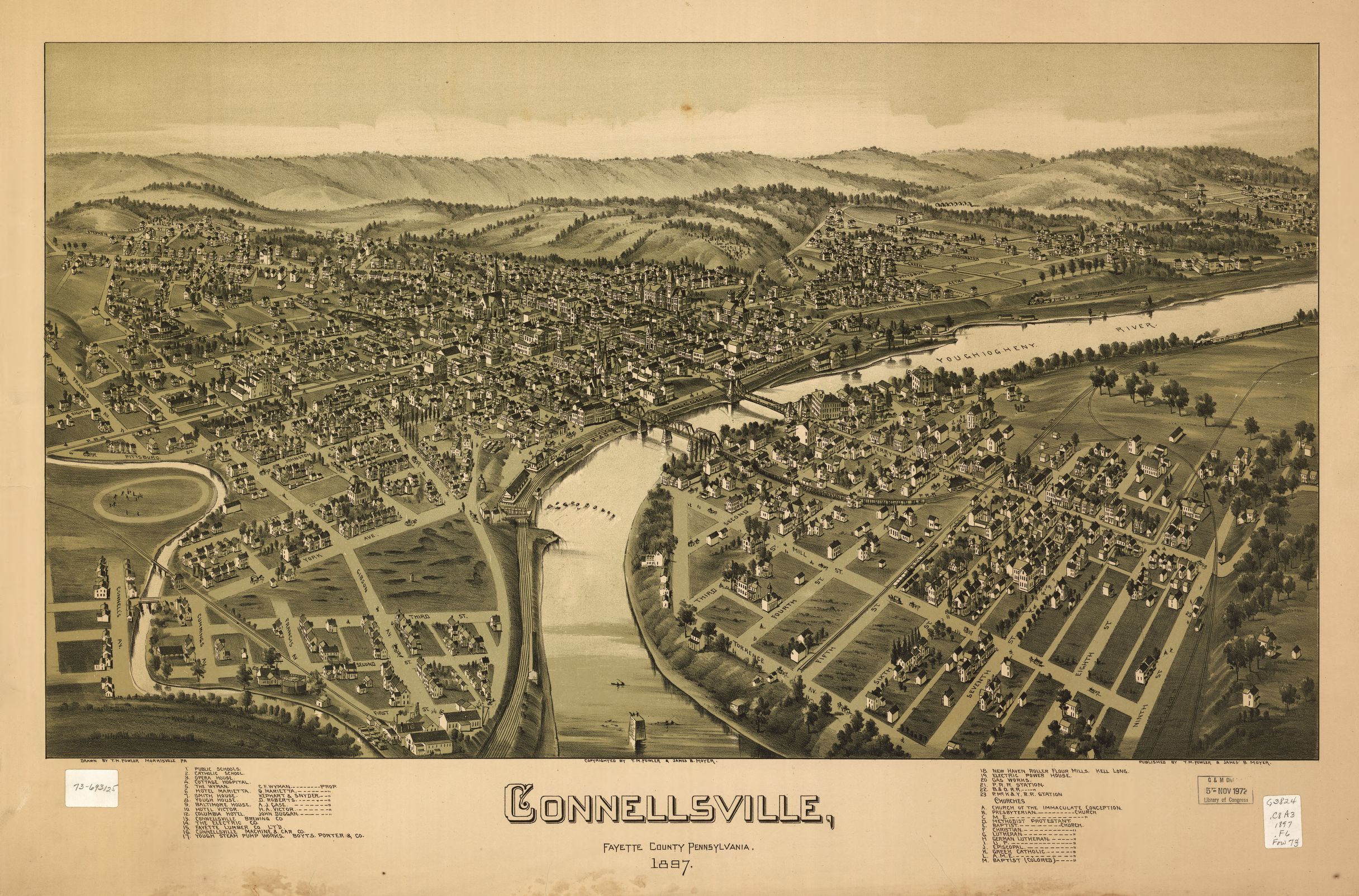Connellsville A Family History
Connellsville
Connellsville History > Coke & Coal > Steel industries of Pittsburgh

Connellsville, Fayette County, Pennsylvania 1897 Image: https://www.loc.gov/item/73693125/
Connellsville, Pennsylvania
Connellsville is a small city in Fayette County known today for its location along the Youghiogheny River its role in regional tourism, and as a stop on the Great Allegheny Passage trail.
Connellsville was a principal hub for coal mining and coke production during the late 1800s and early 1900s, providing essential fuel for the United States steel industry.
The area that became Connellsville was first settled in 1770 by Zachariah Connell, a land surveyor and namesake of the town.
My family’s ancestors were among the first settlers, as traced back through Francis Louise Means’ mother‘s side of the family. This lineage is established through Louise’s mother Bishop, who’s grand of a McCormack, who was also married the sister of Crawford.
The Great Allegheny Passage trail is a 150-mile rail-trail linking Cumberland, Maryland, to Pittsburgh, Pennsylvania, forming part of a continuous non-motorized route between Washington, D.C., and Pittsburgh.
Coal & Coke
Significance: Considered among the world’s richest mineral deposits, the Pittsburgh seam of coal underlying portions of Fayette and Westmoreland Counties in southwestern Pennsylvania produced metallurgical coke of exceptional quality. Covering nearly 147 square miles, the seam’s thickness, nearness to the surface, friable structure, and chemical attributes made Connellsville coke the ideal fuel for late nineteenth and early twentieth century iron furnaces. Combined with the adjacent Klondike fields, the region contained the world’s largest complex of beehive coking ovens.
Connellsville Coal And Coke Region [Survey HAER PA-283]
• 181 page document [PDF] • 13 Maps & Measured Drawings
From the Historic American Engineering Record (HAER) is a federally run heritage documentation program established in 1969 by the National Park Service, the Library of Congress, and the American Society of Civil Engineers. It produces official records of historic engineering and industrial sites, housed in the Library of Congress.
Wikipedia
Connellsville population peaked in the 1940s, and has declined ever since.
Connellsville is a city in Fayette County, Pennsylvania, United States, 50 miles southeast of Pittsburgh on the Youghiogheny River, a tributary of the Monongahela River. It is part of the Pittsburgh Metro Area.
The Brooks side of our family were the among the first settlers of the area, pre-dating Zacharia Connell’s arrival.
During the French and Indian War, a British army commanded by General Edward Braddock approached Fort Duquesne and crossed the Youghiogheny River at Stewart’s Crossing, which is situated in the middle of what is now the city of Connellsville. Connellsville was officially founded as a township in 1793 then as a borough on March 1, 1806, by Zachariah Connell, a militia captain during the American Revolution. In February 1909, balloting in New Haven and Connellsville resulted in these two boroughs joining and becoming the first city in Fayette County on May 12, 1911. Due to the city’s location in the center of the Connellsville Coalfield, coal mining, coke production, and other accompanying industries became the major sources of employment and revenue during the late 19th and early 20th centuries. Connellsville became known at the “Coke Capital of the World” due to the amount and quality of coke produced in the city’s many beehive ovens.
English settlers discovered coal in Eastern North America in 1673, but commercial coal mining did not begin until the 1740s. It remained a small industry until the early 1800s, as American settlers preferred to use the plentiful supplies of wood. Evolution of the Coal Industry in America Arcadia Publishing ( https://bit.ly/372USEU )